Foreward by Louie Scoot-Virgo, famed Magic art collector:
When I was a boy, my estranged father took me to see a Magic show at my estranged uncle’s bar. The Magician was a sad man: older, balding, hands arthritic from the repeated flick of the rabbit from the hat. But what struck me above all else was the wonder he filled the room with. Every child’s eyes were wide, his mouth drooling with the promise that he would bear witness to something amazing: that he was the chosen one. How could the magician do this? Because of his bloodthirsty desire to win. To win at all costs. To bet time and love on the roulette wheel of fate and roll blackjack. To do anything, even those things beyond the realm of man. To be superman.
I caught up with him on a stool and bought what little domestic beer my allowance could purchase and asked him how he got his drive. He giggled and with a knowing wink rasped this at me, “Sharpen your ears. You can’t be watching the spider’s web.” As we talked and drank he revealed his Ten Fold Path to Victory and with each gulp of Miller Lite I drank it in. As the divine night drew to a close and the cruel sun peeked through the window, he stood up, gathered his coat, handed me the original artwork for Spore Cloud, and disappeared into the wide world, a world of children in need of a little Magic.
I’ll never forget those words he told me but I’m not comfortable writing them down so I told them to a friend and we agreed this is a comfortable middle-ground. Spore Cloud formed the base of my Magic art collection, which has now grown to over six pieces. I am bloodthirsty.
10. Recycle
9. Save Up
8. Only Hang Out With the Right People
7. Draw Cards
6. Know Your History
5. Always Spend Your Mana
4. Petty Theft
3. Wake Up Early
2. Mono-Red
1. Respect
Does this scenario sound familiar?
“Draw a card, play Island, go.”
Welcome to Hell.
Crap, you say to yourself, Joey’s playing his Rite of Replication deck tonight.
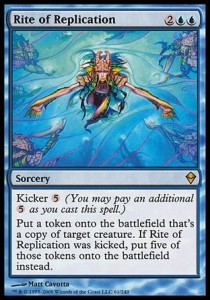
Good news for you, though: you spent your Plains activating [card]Sensei’s Divining Top[/card] during your turn, so you give the top three another look.
Thank god for house rules.
Since Bill’s successful campaign to get [card]Spell Snare[/card] banned, you know the path is clear for the [card]Squire[/card] you just moved to the top. By the time Joey deals with it, you’ll have all the mana you need.
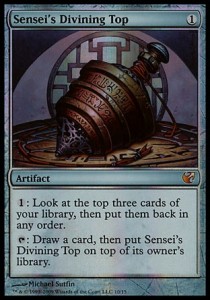
We’ve all been there. The worst possible play that could have happened to you turns into a moment of triumphant victory. It’s because you set it up, you formed a backup plan, and you spent your mana to do it.
When you choose a deck to play, you have to decide which turn you intend to play on. A faster red deck plays on its own turn; slower draw-go style of deck plays on its opponents’ turns; a combo deck is not afraid to play on everyone’s turns.
When you moved your Squire to the top of your deck? That was on your opponent’s turn. Through careful use, Top turns your entire deck into a combo deck: every card you draw now reads, “1: scry 1.5.” If you always spend your mana, you can stay on top of the game.
In strategy gaming, the invariably central game mechanic is managing resources. In Chess, you manage your pieces; in Poker, you manage your chips; and in Magic, you manage cards. Another way of looking at this dynamic is against an opponent: by countering or destroying your opponent’s resources, you gain advantage by denying them any option other than conceding. As such, any play made in these games can be thought of as a one-for-one exchange: when you gain resources, your opponent loses choices.
For example, say you cast [card]Time Walk[/card]. You’ve gained a turn, which means your opponent has lost a turn. But lots of cards are like Time Walk when you plan a strategy in terms of time and resources spent: if you cast [card]Grizzly Bears[/card] and your opponent spends a turn casting [card]Shock[/card] to remove it, then you’ve gained three times the advantage, because your opponent is down a card, a mana, and a turn.
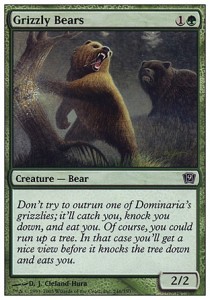
What are some other forms of advantage we can look to? Consider the resources often left on the table, for example the upkeep step. Usually cards affect this step by costing resources in some fashion, but otherwise this step often goes wasted because only instants and abilities can be used here. Consider what a card like Shock means for you if cast on your opponent’s upkeep: they’ve just untapped, but suddenly they’re down two life when they hadn’t planned to be. Now their draw step has been radically altered, since the card they were hoping to draw may no longer be a valid strategy — they know you’re playing with fire, and have only one phase and one extra card to adapt a new strategy. This often causes fatal misplays from an opponent who can’t adapt on the fly.
More important than that, you’ve stolen three things from your opponent: a step of his turn, two of his life, and a pre-planned strategy.
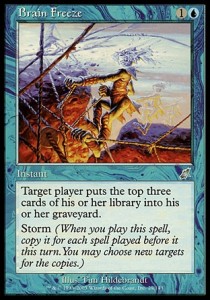
Cards like [card]Seedborn Muse[/card], [card]Paradox Haze[/card], and [card]Time Stop[/card] excel at this sort of strategy because they serve to gain extra resources for you that your opponent otherwise isn’t using, rendering those resources lost to them. Take everything from your opponent and they will be left with nothing. With a deck full of Time Walks, your opponent will be taken out completely: how can he play if he has no turns?
The best thing about the advent of online Magic clients such as Magic Workstation is that, no matter what time it is, there’s an opponent waiting to be beaten.
There’s a lot to be said about waking up early. Many of the world’s leading CEOs have gone on record as saying they’re at their peak when they get up at 5 AM, slug a can of Dew and a bag of Cool Ranch Doritos, then skip over the treadmill and hop right into a match. Exercising your brain is far more important than exercising your body, because your brain controls your body: if it is stimulated past its usual ten percent, your brain will take care of the rest of your body while you fell foes with a flurry of clicking and typing.
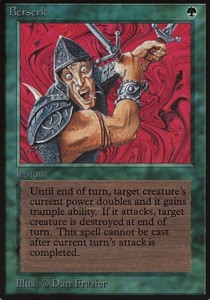
How you plan your day is just as important as how you plan your play. In the morning, your brain is close to a blank slate, which helps with making stronger instinctual plays while keeping your creative processes empty and fresh. This is similar to the process I call “Developing Your Mana”: each decision you take during the day is like a land drop, and your day starts going once you build up enough resources to make the big plays.
Imagine a notepad in your brain that starts on a blank page, and as you go through the day, it starts to fill up: bad matchups, losing to bad players with good luck, mana screw, these things all take up space in your mind as your day progresses. As the board fills up with lands and creatures (tasks and obligations), it becomes cluttered and difficult to navigate.
While it is important to keep these things in mind to learn from later, you must also keep your focus on the opponent at hand, because you never know when Stacy will call out and make you go in for your shift at Best Buy a little earlier, costing you valuable testing time and causing you to forget the data you’ve collected about the terrible cards your lucksack opponent is currently throwing at you.
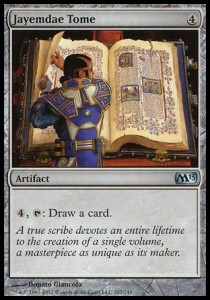
Sun Tzu once wrote that a sharpened blade cuts more enemies. If you keep your mind sharp, you will be able to line up your opponents and strike them down, one by one, but if you leave your blade to dull, you will quickly be overtaken. Sharpening your weapon the night before a major battle is like playing a land on turn one: disciplined, fundamental, and in some cases necessary to succeed.
Keeping your brain fueled keeps your play clean and sharp; keeping your play clean and sharp helps you defeat your opponents.
As we learned in Habit 7: Draw Cards, a deck of 60 [card]Shock[/card]s, while having the potential to deal 120 points of damage, doesn’t work very well when you bring it to a tournament, mostly because Shock costs mana to cast (but also because it is illegal to run more than four copies of Shock). You would think this would make a Shock-based deck unviable. However, you have not read to the end of this chapter. As you will learn, it is possible to also run cards with similar effects.
For example, I have purposely ignored the existence of [card]Lightning Bolt[/card] until now to illustrate this point. Four Lightning Bolts and four Shocks combined adds up to 20 life and a dead opponent. You now have 52 other slots you can use to kill your opponent even more.
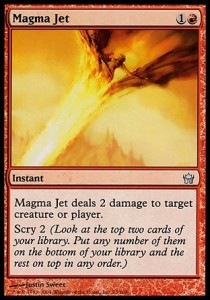
In most games of Magic, you will not draw your entire deck. Instead, we spend the game looking to draw the best cards in our deck, filtering through what won’t help us right now in order to find the cards that will. Sometimes, with cards like [card]Arc-Slogger[/card], the cards in your deck don’t matter; what matters is that your deck simply has cards. Being able to set your deck on fire is a great feeling, and in this way we get around that stupid four-copies rule by turning our entire deck into Shocks.
Sometimes your opponent plays cards that gain life. Your job is to kill them harder.
Sometimes your opponent plays cards like [card]Ivory Mask[/card], but those cards are bad so you should win anyway.
Sometimes your opponent splits the difference with cards like [card]Circle of Protection: Red[/card], which wastes their mana and gains you resources every time they fruitlessly stave you off for another turn.
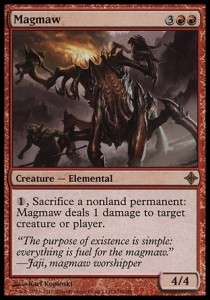
It doesn’t matter how much life they gain, or how much they hold you back, as long as you break through for that final point of life. Nothing else is sacred: not your permanents, not your deck, and certainly not their face. The final point of life is all that counts.
Google defines “respect” as follows: “a feeling of deep admiration for someone or something elicited by their abilities, qualities, or achievements.” Now ask yourself: when’s the last time you felt deep admiration for an opponent that just countered your spell, destroyed your land, or wiped the board with an [card]Obliterate[/card] without giving everyone three turns’ warning?
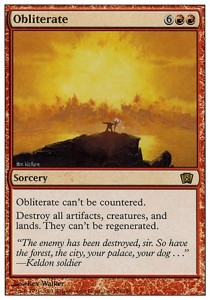
Think back to the last time someone called you a nerd. Remember what t-shirt they were wearing? It was an Affliction shirt, with the motto “Respect is Earned” written in gothic font. You were probably too busy feeling disrespected to realize that his shirt was telling the truth: respect is earned, and you felt disrespected not because of the insult, but because you knew at that moment that you did not earn his respect, despite how sweet your custom playmat and deckbox look. He disrespected you because he did not see you as a peer, but as being lesser.
When you are facing an opponent, you fundamentally are disrespecting his ability to play by asserting your dominance. You may offer a handshake and a “good game,” but by the time you lined up your Squire to steal his last point of life, you felt superior. Inside, you were wearing that Affliction shirt. You earned your respect.
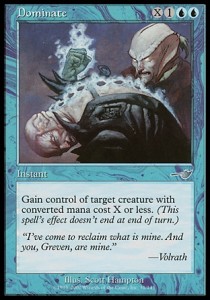
When dealing with any element of Magic, from building a collection to defeating an opponent, you must have respect for yourself. Your goal is to not make friends, your goal is to be superior to all those around you. If your opponent does not respect you, he will crush you in short order. If you do not set out to earn respect, you have lost before you’ve begun.